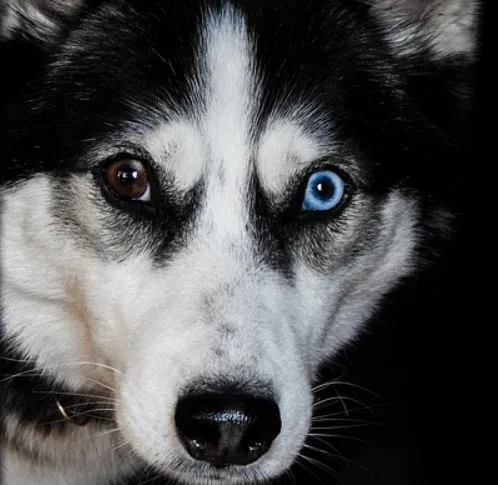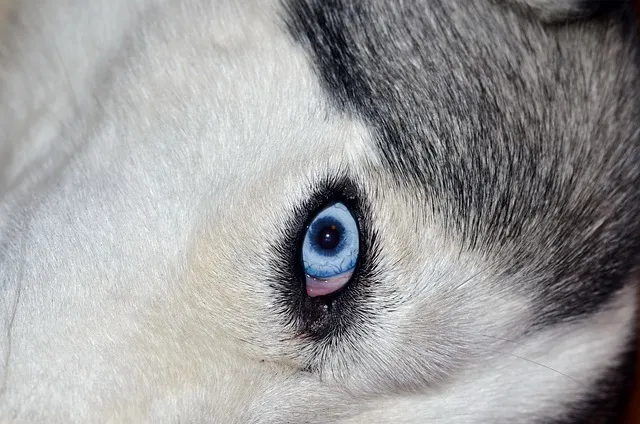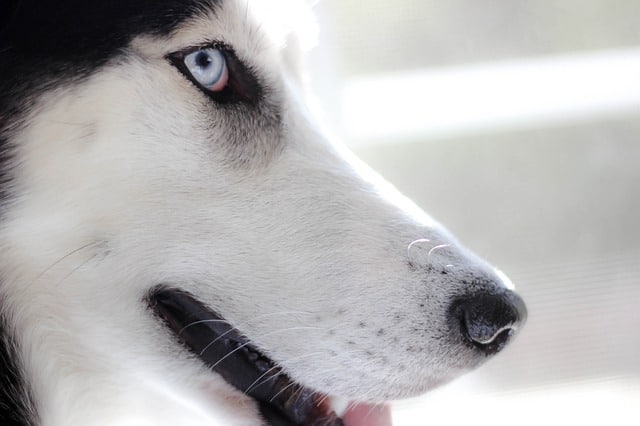Siberian huskies are quite the stunners when it comes to dog breeds, with their soft, thick rich coats and piercing almond-shaped eyes.
Huskies are wonderful happy-go-lucky and exuberant dogs that love their playtime, especially when the weather is cold and snowy, and even more so when they have a family to frolic with.
You can’t imagine your active husky with any health issues, especially eye problems. You would probably assume that eye disease may only be an issue in senior dogs. This is not always the case if there is a genetic cause.
Your husky has beautiful eyes that don’t miss too much, but there are some eye problems and diseases that Siberian huskies are prone to.
In the following post, I will cover husky eye color, husky eye infections, problems, and diseases that can affect your husky’s eyes. This is meant to inform and not alarm you as some of these issues are rare.

For your dog’s vitamin supplement, food, toys, or other dogs product please visit the Sundays for dogs website.
Siberian Husky Eye Color
Siberian Huskies are such a unique and stunning breed with gorgeous fur and their eyes are by no means an exception to the rule.
Siberian husky Blue eyes
All huskies share the distinct characteristic of almond-shaped eyes, but they are well-known for their clear, cool blue eyes.
This gives them a striking appearance with icy blue eyes against a backdrop of black, grey, and white fur. Huskies with blue eyes can have lighter arctic blue eyes or deeper cobalt eyes.
Huskies also have a noticeable black ring around their eyes that accentuates the blueness but sometimes makes them appear angry, even though they have a jovial demeanor.
Just as football players use “eye black” under their eyes to cut down on the glare caused by the sun or stadium lights, the husky’s black eye ring does the same job on bright snowy days.
To check your Huskies’ health status or their DNA checks, please visit the Embark vet website for all the help you may need.

Siberian husky Brown eyes
Not all huskies have blue eyes and some will have brown regardless if both parents have blue eyes. Brown is a dominant gene.
Their brown eyes can be light amber or a deep nut brown. Many are confused when huskies have brown eyes, immediately thinking they are malamute. Malamutes always have brown eyes but are somewhat larger than huskies.
Siberian husky Bi-colored eyes
Another unusual option that many find unsettling and that is found in Siberian huskies is heterochromia.
This sounds like a disease but it just means that each eye is a different color, most commonly one blue and one brown.
This is no cause for alarm and has no ill effects. Heterochromia is quirky and some humans have these eyes also but it is more common in animals.
Siberian husky Green eyes
Very rare in a Siberian husky are green eyes. This is believed to be the result of when a husky’s eyes are transitioning from blue to brown, this phase does not completely finish, leaving your husky with green eyes.
Siberian husky Parti-colored eyes
The eyeshades mentioned, even the rarer shades, do not predispose your husky to eye diseases and problems.
Studies have not found that one Siberian husky eye color over another is more prone to issues. These colors show just how unique Siberian huskies are.
Siberian Husky Eye Infections
Here are a few eye infections that huskies can suffer from along with symptoms and treatment.
Conjunctivitis (pink eye)
Conjunctivitis is a common eye infection in dogs. Inflammation of the mucus membranes in the front of the eye and eyelid causes the eyes to become swollen and red.
This can sometimes occur in one eye or spread to both. A constant discharge of mucous will drain from the affected eye.
This is most often caused by bacteria or a virus and even some parasites. Pink eye is treated by cleaning the eye with wipes or eyewash, antibiotic drops, and sometimes oral antibiotics.

Corneal ulcer and infection
A corneal ulcer can occur if your husky’s eye becomes scratched while playing or with a branch or twig. Bacteria can enter the cut, become infected, and result in a corneal ulcer.
This needs to be treated early on because if the infection gets deep into the eye, removing the eye may be necessary.
Your pup may experience pain from this and corneal ulcers are treated with ciprofloxacin or ofloxacin, topical antibiotics.
Uveitis
Canine uveitis is an infection of the eye that causes inflammation of the inside of the eye. Symptoms are a cloudy eye, redness and the eye may look bloody.
Your pup may also have blurry vision, eye pain, and sensitivity to light. The causes are bacteria, blastomycosis (parasites in soil and leaves), and rickettsia ( caused by tick bites). Treatments are steroids in the form of drops, and dexamethasone.
prednisone, betamethasone, and in some cases, oral prednisone. If not treated, blindness can occur.
Siberian Husky Eye Diseases
Here are a few eye infections that huskies can suffer from along with symptoms and treatment.
Conjunctivitis (pink eye)
Conjunctivitis is a common eye infection in dogs. Inflammation of the mucus membranes in the front of the eye and eyelid causes the eyes to become swollen and red.
This can sometimes occur in one eye or spread to both. A constant discharge of mucous will drain from the affected eye.
This is most often caused by bacteria or a virus and even some parasites. Pink eye is treated by cleaning the eye with wipes or eyewash, antibiotic drops, and sometimes oral antibiotics.
Entropion
This disease causes the curling of the lower eyelid to roll into the eye. It can be painful and also cause corneal scarring. Surgery can correct this.
Entropion is a genetic disease and huskies carrying this dominant gene should not be bred.
Corneal dystrophy
In Siberian Huskies, this is a condition that is inherited. Sometimes known as crystal corneal dystrophy, it causes white tiny crystal deposits to form in the cornea and leaves vision cloudy.
This is not a painful disease and is slow to progress, with minimal visual impairment, but in rare cases, blindness can occur. At this time there is no treatment to cure the disease.
Retinal dysplasia
This eye problem causes folds in the retina of puppies and is exhibited by white streaks when examined by a veterinarian. Most often dogs grow out of this.
Corneal lipidosis
Symptoms of this condition are found on the edges of the cornea, appearing as tiny specks. This is believed to be inherited but causes no vision problems and there is no treatment.
PRA Progressive retinal atrophy
This is an eye disease that humans also can suffer from and it’s believed that humans and huskies suffer from the same type of PRA. Like its name, this is a progressive disease.
The normal person would not see any signs in the early stages, only an ophthalmology exam would pick up on it and in later stages, cataracts may be noticeable.
You may notice that your husky becomes apprehensive in the dark, which is night blindness.
This will progress to complete blindness. There is no cure, just preparation to acclimate your pup to a life without sight.
This is an inherited disease and most often occurs between 5 months and 3 years and is more prevalent in males.
Glaucoma
This disease’s symptoms cause painfully red eyes and enlarged pupils. For a successful outcome, treatment must be started early or permanent blindness will be the result. Eye drops are used and if needed, surgery.
Cataracts
In huskies, hereditary cataracts can occur at a young age or your husky may develop these as a senior.
Cataracts cause the lens of the eye to be opaque or cloudy and can occur in one or both eyes. They can alter vision and cause eventual blindness if no treatment is sought.
The type that most huskies exhibit progresses slowly. Surgery is sometimes required and those huskies with hereditary cataracts should not be bred.
When considering a Siberian husky, always seek out a reputable breeder for assurance of a healthy pup. Many other diseases, as well as conditions of the eye, are hereditary.
Question the breeder if their breeding huskies have been genetically tested and if they’ve had eye screenings for eye conditions or diseases.
If they are a highly sought-after breeder with a stellar reputation, they will gladly give you all of the information you want.
Your Siberian husky may never experience any husky eye infections or diseases, but hopefully, this information will have you on your toes if you spot anything at all out of the ordinary with their beautiful eyes.